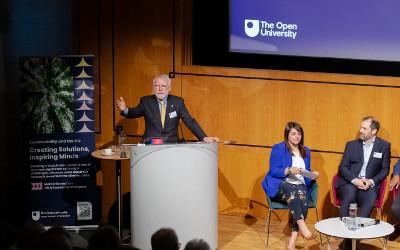You are here
- Home
- Year of Mygration
- Day 73, Year of #Mygration: Who's caring for the front line workers?
Day 73, Year of #Mygration: Who's caring for the front line workers?

Who’s caring for the front line workers? Dr Vita Terry puts forth the idea of using an ethics of care perspective to explore the pressures frontline workers face in the voluntary sector.
"During my PhD research project I conducted an ethnographic study on three voluntary sector organisations (VSOs) providing advice and advocacy to asylum seekers and refugees. Whilst my PhD explored how VSOs respond to multiple external pressures, such as the financial crisis, competitive funding environment and welfare reform, I was not only struck by the organisations’ resilience to adapt to the changing environment but also the agency and commitment demonstrated by the frontline workers.
My PhD argues that VSOs are not homogenous, and nor do organisations experience or respond to the environment in the same way. For example, VSOs that support asylum seekers and refugees are also embedded within a complex migration policy environment, with continuously changing restrictive and deterrent immigration policies. When including wider xenophobic attitudes into the mix this can create an additional hostile layer for organisations to operate within. Whilst a wealth of literature has concentrated on highlighting the external pressures and influences on VSOs, the refugee sector has not received the same recognition, and tends to focus on the organisation rather than the micro level.
During my time with the organisations the everyday challenges, tensions and pressures were clearly visible. On a daily basis the frontline workers experienced high demand for their services, with service users often lining up outside the premises way before opening hours. It was common to see staff working through breaks and feelings of guilt when taking ten minutes out to eat lunch. The rise in demand from service users results from increasingly restrictive policy changes and complex case work, reduced state services and welfare reform, coupled with a decline of internal and external resources to meet the demand. The combination of these factors has built work intensification as well as creating a highly stressful work environment for frontline staff.
 On top of these challenges, I also witnessed the high emotional demand on frontline workers supporting clients with traumatic experiences, with complex cases involving torture and trauma, which can result in physical or mental health concerns for the service user. This emotional demand was arguably a driving force for the frontline workers to go above and beyond their work duties, to ensure the needs of service users were met. However, the impact of this emotional burden on frontline workers is often ignored within voluntary sector literature.
On top of these challenges, I also witnessed the high emotional demand on frontline workers supporting clients with traumatic experiences, with complex cases involving torture and trauma, which can result in physical or mental health concerns for the service user. This emotional demand was arguably a driving force for the frontline workers to go above and beyond their work duties, to ensure the needs of service users were met. However, the impact of this emotional burden on frontline workers is often ignored within voluntary sector literature.
Wider literature has highlighted concerns about this environment, such as work intensification, commissioning creating emotional upheaval and accentuating staff insecurity, which can create low work morale. There has also been some attempt to explain the commitment of staff by the sector’s distinctive values that motivate a strong ‘work ethos’ (see Lipsky and Smith, 1990). From my observations, these examples of frontline workers ‘going the extra mile’ in the face of rising pressures was grounded in emotions, morals and values. This depth of analysis is often missed in voluntary sector literature but is arguably essential to understand the current work conditions and impact on frontline workers. I argue more recognition should be focused on highlighting this potential risk (from the combination of factors identified) on individuals’ emotional wellbeing, which could cause stress, burnout and even result in sick leave. Ultimately, this could result in poor service provision for asylum seekers.
My idea, therefore, is to draw on the ethics of care perspective as a lens to understand how frontline workers interpret, negotiate and respond to these rising pressures. The ethics of care, founded by Tronto, is based on a process possessing four connected phases (caring about, taking care of, care giving, care receiving and caring with) that, in conjunction with four corresponding moral values (attentiveness, responsibility, competence and responsiveness respectively), provided an integrity (ethic of care). By applying this lens it not only explains the everyday practice of frontline workers, explained through the relational experiences the frontline workers have with the service users but it provides a critical lens to understand where this responsibility of care should lie (see work by Sevenhuijsen 2000, 2003).
Some important questions come out of this perspective that invite further exploration:
-
Is the responsibility of care for asylum seekers being shifted onto the voluntary sector albeit without the appropriate resources?
-
Are these frontline workers being exploited during this process?
-
How can this responsibility be shared more appropriately across the sector/sectors?
-
What lessons can be learnt from the social work field to prevent frontline workers from this predictable ‘burn out’?
My research aims to shift the focus from the organisation to the individual, to understand what is happening at a deeper emotional and moral level and bringing the needs and concerns of frontline workers to the forefront of debate. Lessons learnt here are not only relevant to refugee organisations, but can also be applied across different policy fields within the voluntary sector."
Dr Vita Terry is a Research Fellow in the Faculty of Business and Law.
Quarterly Review of Research
Read our Quarterly Review of Research to learn about our latest quality academic output.

Contact our news team
For all out of hours enquiries, please telephone +44 (0)7901 515891
